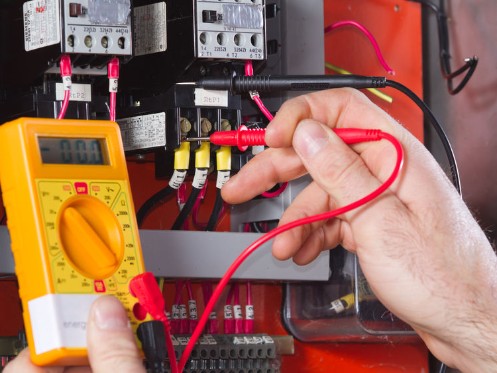When discussing the electricity that powers the appliances in your La Vernia home or office, you may have heard terms like “watts” or “amps.” These words are commonly used, but many people are confused about what they mean and what differentiates a watt from an amp. Knowing the distinction between these terms can benefit you as a homeowner or business owner because it may affect the appliances you buy and could help you save money on electric bills.
What Is a Watt?
A watt (W) is a standard unit of power. It defines the rate at which an item consumes energy. One watt equals one joule per unit of energy flowing per second.
The most straightforward analogy to describe watts is to compare them to miles per hour. Let’s say that you have a 100-W lightbulb. The rate at which energy flows through the lightbulb is measured in watts. A watt lets you know how fast electrons travel through the system. A 100-W lightbulb will use energy at a rate of 60 W. For comparison, an average laborer working eight hours a day creates 75 W of power. One horsepower equals 750 W. Conversely, a nuclear power plant puts out 650 million W.
A watt-hour is the energy an item consumes in an hour. When you see your electric bill at the end of the month, the amount of electricity your home consumes is typically measured in kilowatt-hours.
You can perceive watts as speed and watt-hours as distance. Therefore, imagining a watt would be like describing the miles per hour you drive at a specific moment. A watt-hour specifies the amount you travel at that speed over a period of time. A kilowatt-hour represents an electrical energy measurement that equals the power consumption of 1,000 watts for one hour. One kilowatt is approximately equivalent to 1.34 horsepower.
What Is an Amp?
One ampere, commonly abbreviated as “amp,” is a unit of electric current. It measures the flow rate of electric charge in a circuit. One ampere is the amount of current that flows when one coulomb of charge passes through a given point in one second. In simpler terms, it represents the rate electric charges move through a conductor. The ampere is a fundamental unit in the International System of Units (SI) and is widely used in various applications, including electrical engineering, electronics and physics.
You can imagine that the electricity from the breaker panel in your home or office is like water from your kitchen faucet. You can turn the faucet to a low setting, and the water will flow slowly. It will take more time to fill up a glass with a slow water flow. This is a good description of how low amperage works with electricity. If the amps are too low for the appliances or devices that you have in your household, you will see blown breakers. Connecting devices to a system with low amperage for too long can lead to a fire.
Watts Versus Amps
Some basic principles to remember when distinguishing between amps and watts are that amps measure how electricity flows through a circuit. In contrast, watts measure the speed or rate at which the electricity is consumed. A basic calculation is that amps equal charge divided by time, whereas watts equal volts multiplied by amps.
You can also distinguish the two by thinking about them in relation to voltage. With amps, the current is directly proportional to voltage. With watts, power is the equivalent of voltage multiplied by current.
Amps are used when an electrician wants to determine a circuit’s load or to identify a conductor’s capacity. On the other hand, watts are used to measure the power consumption or power output of electrical devices.
Amperage that is too high can lead to overheating or electrical shocks. High wattage is a safety hazard as it can lead to device damage or electrical fires.
Both amps and watts are significant electrical measurements that help electricians understand the characteristics of electrical energy. Understanding the relationship between amps and watts and how they change based on a circuit’s voltage is critical to understanding how electrical systems function.
Trusted Electrical Services for South-Central Texas
At GVEC Electrician Services, we proudly offer homeowners and small businesses the best in professional electrician work. We are experts who you can trust. Our technicians are licensed, knowledgeable, and our services are dependable. Our services include electrical panel upgrades and repairs. We offer exterior lighting upgrades, electrical rewiring, whole-home surge protection and general electrical upgrades. Contact GVEC Electrician Services today and see what it is like to receive electrical services from knowledgeable professionals who care.



